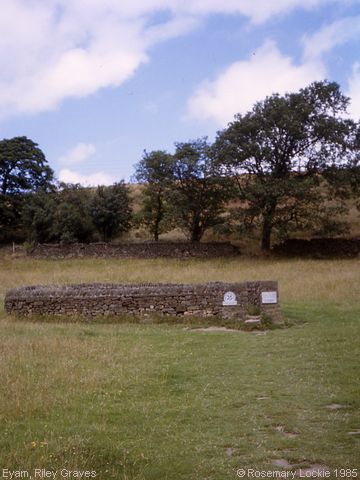Riley Graves, Eyam (National Trust Site)
The protective stone wall, with prominent National Trust and Information signs encloses Memorials marking the graves of John HANCOCK, who with 2 sons and 4 daughters died of the Plague in August 1666. The Inscriptions on the Memorials read as follows:- Sacred to the memory of the Hancock family victims of the Plague. (Each inscription is on a separate tombstone)
On a table tomb: HERE LIEH BVRIED [T]HE / BODY OF IOHN HANCOCK / SEN WHO DIED AVG 7H / 1666 So far as it is possible to tell from baptisms recorded in the Eyam parish register, the children were all under-age - John junior would have been aged 6 (baptised 1660); Elizabeth would have been aged 8 (baptised 1658), Oner aged 3 (1663), Alice aged 15 (1651), and Ann aged 10 (1656). Curiously, William isn't mentioned amongst the baptisms, but his burial is recorded as taking place on the same day as his father - August 7th - “buried John Hancocke”, the next entry being “William, his son”. It is understood the father's tomb marks his actual grave;[1] but the other stones were collected from their respective sites and assembled in the enclosure by Thomas BIRDS, an Eyam antiquary. BIRDS lived in Eyam Dale House and died in 1828.[2] At a later date the inscriptions were cut more deeply at the expense and instigation of Sir Henry Burford HANCOCK, who at the time was Governor General of Gibraltar.[3] It is not known at this time whether Sir Henry was a direct descendant. And before anyone asks - when so many of the family died, how could there have been descendants... well apparently the mother, Elizabeth, survived the epidemic, or at least her burial is not recorded in the parish register. The legend tells us that she left the village to go to live in Sheffield with a surviving son, who had been previously bound as an apprentice in Alsop-Fields, Sheffield. Joseph Hancock, who in 1750 discovered (or “recovered”) ‘Sheffield Plate’, or the art of plating goods, is reported by William Wood[4] to have been a descendant of this son. Wood also says it was the son who erected the tomb and stones originally, but unfortunately “legend” is all we have at present, as I have yet to find records to prove this elder son's existence. The only member of John & Elizabeth's family who is unaccounted for on this gravestone, or amongst the burials, is a daughter Joan, who was baptised at Eyam on 24th December 1654. Incidentally 'Oner' [Honor?] was also a girl, according to both her baptism and burial
records - not a boy, as suggested by Wood,[4] when he writes
of the mother Elizabeth burying 'John, her husband, and two sons, William and Oner'.
The Eyam Parish Register records:- (Information provided by Rosemary Lockie) References
Image contributed by Rosemary Lockie in June 1985.
|
||||||||||||||||||||||||||||||||||||||
